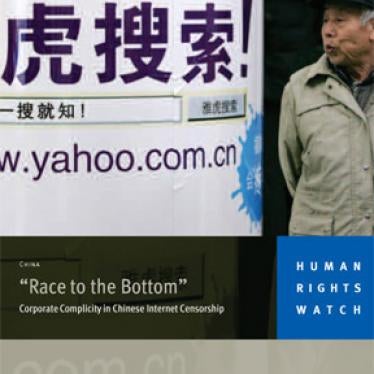(Washington, DC) Microsoft CEO Steve Ballmer's statement today on internet censorship in China falls far short of what the industry standard should be for protecting freedom of expression on the web, Human Rights Watch said today.
In an official blog message posted late in the afternoon of January 27, Ballmer suggested that Microsoft's internet freedom policies had the imprimatur of the Global Network Initiative (GNI), composed of industry officials, human rights representatives including Human Rights Watch, and other experts.
Ballmer said Microsoft opposed restrictions on internet freedom in "conversations with government." But the GNI calls on companies to be more aggressive, taking steps such as challenging government censorship in domestic courts, or raising the issue widely with government and international officials. Microsoft has not said whether it is doing these things.
"Microsoft still needs to say how it is going to fight censorship," said Arvind Ganesan, director of business and human rights at Human Rights Watch "We agree with them that restrictions on peaceful dissent are wrong, but don't know what the company plans to do about it."
Microsoft's actions appear in stark contrast to recent announcements by Google that it is prepared to pull out of China if the government continues to restrict its Chinese-language search engine.
Recent public statements by Steve Ballmer, the chief executive officer of Microsoft, and Bill Gates, the company's chairman and co-founder, appear to contradict the company's official statement of opposition to such censorship and minimize or even support online censorship in China.
"Microsoft is on the wrong side of this issue," said Arvind Ganesan, business and human rights director for Human Rights Watch. "Just as the US government and a company like Google are starting to push back against censorship, Ballmer and Gates seem to be going the other way. Unless Microsoft clarifies its position, the Chinese government and others will take great comfort in how easy it is for them to divide and co-opt opponents of censorship."
On January 21, The Wall Street Journal reported that Ballmer told an oil industry conference that, "you have to respect sovereign nations to make that decision [to censor]."
On January 25, Bill Gates reinforced that view and said in an ABC interview that, "The role of the Internet in every country has been very positive, letting people speak out in new ways...[a]nd fortunately the Chinese efforts to censor the Internet have been very limited...it is easy to go around it." Gates also noted that different countries have different laws on censorship and said that "you have got to decide do you want to obey the laws of the countries you are in or not. If not, you may not end up doing business there."
China, a country with more than 300 million internet users, devotes enormous resources to support an extensive online censorship regime that includes sophisticated government firewalls and filtering in conjunction with self-censorship by companies who operate search engines, blogs, or other online media.
The comments by Ballmer and Gates undermine statements by Secretary of State Hillary Clinton in her January 21 speech on internet freedom in which she said, "censorship should not be in any way accepted by any company from anywhere." Clinton also stated that the "private sector has a shared responsibility to help safeguard free expression. And when their business dealings threaten to undermine this freedom, they need to consider what's right, not simply the prospect of quick profits."
The censorship regime blocks Chinese internet users' online searches for politically "sensitive" content and web sites such as Human Rights Watch, other human rights groups, groups advocating for Tibetan or Uighur rights, and the banned Falun Gong spiritual group. The government has actively sought out and obtained the user information of online activists in order to arrest and imprison them for exercising their right to free speech online.
The statements by Ballmer and Gates also seemed to contradict Microsoft's own position after Clinton's speech. Craig Mundie, the company's chief research and strategy officer, said on the company's blog that, "We very much welcome Secretary Clinton's remarks and applaud the heightened attention she's brought to the important issues of free expression and privacy.In particular, we agree with Secretary Clinton that both governments and the private sector have important roles to play." He noted that the "Secretary also highlighted that the United States cannot address these challenges alone, and in this light the emphasis on international cooperation is important."
"We welcome Microsoft's official statement of support for internet freedom on its blog, but the Chairman and CEO need to clarify what they meant," said Ganesan. "We hope they will take the progressive view by unambiguously opposing censorship, working collectively to combat it, ceasing self-censorship on Bing in China, and insisting that Chinese authorities allow an uncensored search engine to operate in China, as Google has."
Mundie also noted Microsoft's membership in the Global Network Initiative (GNI), a voluntary effort to protect privacy and freedom of expression online. It was started by Microsoft, Yahoo, Google, human rights organizations (including Human Rights Watch), academics, and socially-responsible investors.
In 2006, Human Rights Watch and others documented how Google, Microsoft, and Yahoo censored information and how Yahoo released user data to the government that led to the imprisonment of four users for exercising their right to free expression.
The GNI was also recognized by Clinton in her address as one mechanism to promote internet freedom and insist upon corporate responsibility. GNI recommends that companies "Challenge the government in domestic courts or seek the assistance of relevant government authorities, international human rights bodies or non-governmental organizations when faced with a government restriction that appears inconsistent with domestic law or procedures or international human rights laws and standards on freedom of expression." The views of Ballmer and Gates appear to be inconsistent with that approach.





